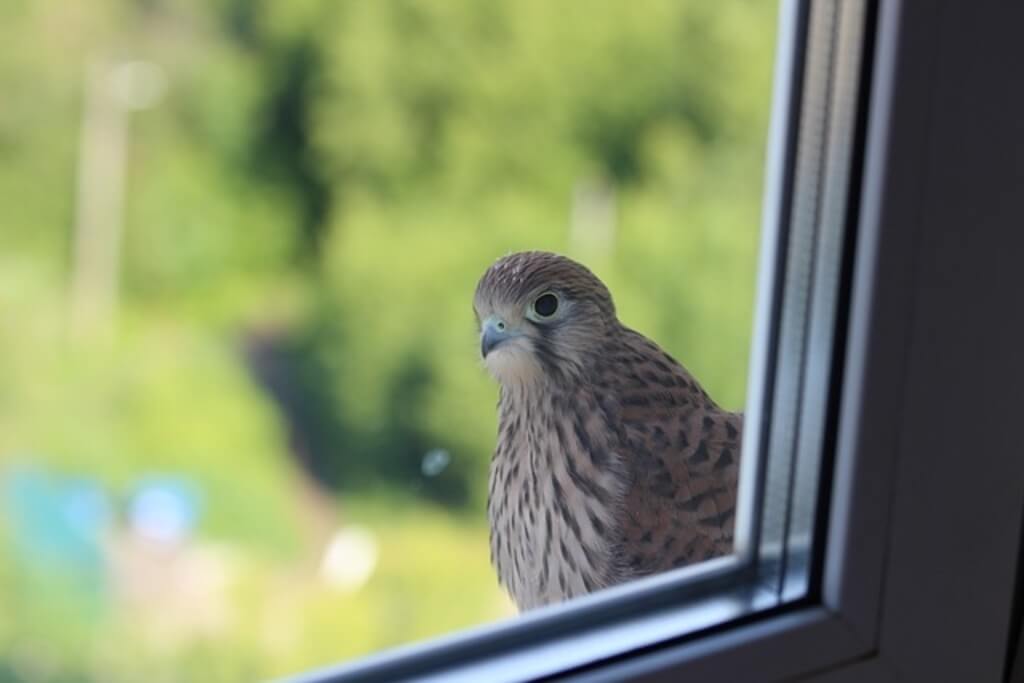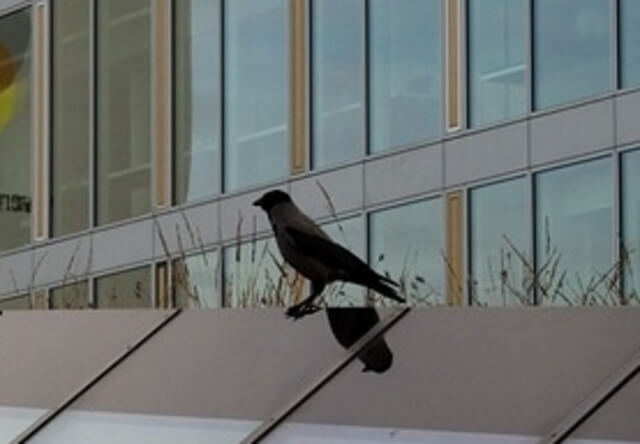Birds are amazing creatures that have the ability to fly. We often think of them as being able to see everything, but can birds see glass? Do birds know when they are flying towards a window or mirror, and can they tell the difference between an open space and something made of glass? In this article, we will explore whether birds can identify glass.
Table of Contents
- 1 Key Takeaways:
- 2 Can birds see glass?
- 3 Why do birds fly into windows?
- 4 How to stop birds from flying into windows
- 5 What to do if a bird strikes your window
- 6 Do birds die when they hit windows?
- 7 Why can birds not see glass?
- 8 Can birds see glass windows?
- 9 Can all birds not see glass?
- 10 Can birds see through glass?
- 11 How to stop birds from flying into windows?
- 11.1 Install Birdsavers
- 11.2 Move Your Bird Feeders Away From Windows
- 11.3 Put Up Window Screens
- 11.4 Lay Down Bird Tape or Gel on Window Sills
- 11.5 Break Up Reflections
- 11.6 Replace Shiny Windows with Frosted or Etched Glass
- 11.7 Hang Wind Chimes Near the Window
- 11.8 Move Plants, Feeders, and Birdbaths Away From Windows
- 11.9 Install Window Decals to Windows
- 11.10 Install a Tight Netting Around the Windows
- 12 Can birds see their reflection in glass?
- 13 Can birds see stained-glass?
- 14 Can birds see through tinted glass?
- 15 Can birds see color?
- 16 Can birds see at night?
- 17 Can birds see mirrors?
- 18 Can chickens see glass?
- 19 Can animals see glass?
- 20 People Also Ask
- 21 Author
Key Takeaways:
- Birds may collide with glass due to reflections or transparent surfaces.
- Bird-friendly solutions like specialized cords, decals or films can prevent collisions.
- Enhancing our understanding of bird behavior helps create safer environments.
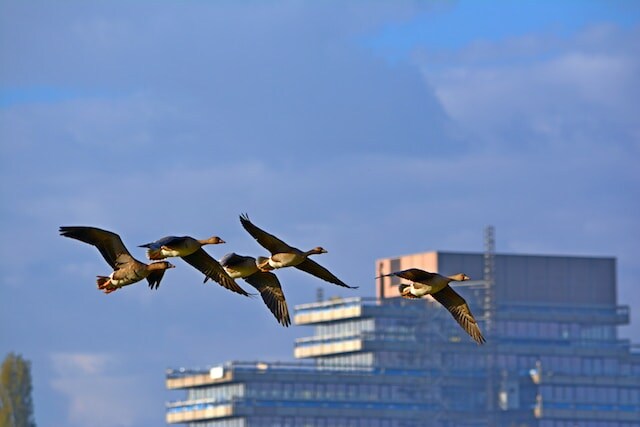
Can birds see glass?
Birds can see glass, but their ability to do so depends on a variety of factors. Like humans, birds have eyes that allow them to perceive light and interpret visual information. However, the structure of a bird’s eye is quite different from that of a human eye, and as a result, birds have different visual capabilities.
For example, many birds have a high degree of visual acuity, which means they can see small details and objects more clearly than humans can.
Additionally, some birds, such as hawks and eagles, have excellent eyesight and can spot prey from great distances. When it comes to glass, birds may have difficulty seeing it because it is transparent. This means that light passes through it easily, making it difficult for birds (and other animals) to detect.
However, birds can see the reflections on glass, which can help them avoid flying into it. Additionally, birds can learn to recognize the pattern of windows and other glass structures over time, which can help them avoid collisions.
Overall, birds can see glass, but it may not be as easy for them to do so as it is for humans. The ability of a bird to see glass will depend on its individual visual capabilities, as well as its experience with the specific type of glass in question.
Why do birds fly into windows?
Birds, despite their exceptional vision, often collide with windows due to a lack of evolutionary adaptation to human-made obstacles. Glass is a recent addition to their environment, and the visual cues that inform them about its presence are absent from their natural learning experiences.
Furthermore, the unique characteristics of avian vision, such as their heightened perception of colors and misunderstanding of reflections, contribute to these collisions.
Unlike humans, birds may perceive reflections in glass as real, leading to misguided attempts to interact with what appears to be another bird or their natural surroundings.
How to stop birds from flying into windows
While advancements in bird-safe glass contribute to minimizing collisions, practical solutions exist for homeowners. DIY methods involve mitigating the transparency of windows through methods such as blacking them out, repositioning plants, or applying large decals.
‘Birdsavers,’ specialized cords, enhance the visibility of windows by reflecting UV light, aiding birds in recognizing them as barriers. Zen wind curtains, consisting of strings strategically placed across windows, can act as a visual deterrent for birds, signaling the presence of an obstacle.
What to do if a bird strikes your window
Immediate action is crucial if a bird collides with a window. Check the bird for injuries, contacting a local wildlife hospital if necessary. If the bird appears stunned but not injured, place it in a warm, dark box with padding, allowing it time to recover.
Observation of breathing patterns, an open beak, and a potential heartbeat can provide insights into the bird’s condition. Patience is key, as stunned birds may take several hours to fully recover.
Is the bird alive or injured? Is the bird stunned?
Assessing the bird’s condition involves a careful examination for visible injuries and an observation of its responsiveness. If the bird is motionless, check for signs of breathing and a heartbeat.
A stunned bird may exhibit slow breathing and a reduced heartbeat, requiring a warm and dark environment for recovery. If injuries are evident, contacting a wildlife hospital becomes imperative for professional assistance.
Do birds die when they hit windows?
The impact of window collisions can be fatal for many birds, with estimates suggesting a significant annual toll, such as the widely cited figure of 1 billion bird deaths globally. Specific figures may vary, but the issue is particularly pronounced in urban areas intersecting migratory routes.
Spring, coinciding with increased migratory behavior, poses a higher risk, with tall buildings exacerbating the problem compared to shorter structures.
Why can birds not see glass?
Birds cannot see glass because of the way that the light reflects off of it. Glass is a transparent material, meaning that it does not absorb light, but rather reflects it. When a bird looks at a window, the light from the sun reflects off of the window and back into the bird’s eyes.
The bird cannot focus on the glass, so it does not recognize the window as an obstacle. This is why birds often fly into windows and other glass surfaces – they simply do not see the glass.
In addition, the smooth surface of glass makes it difficult for birds to identify its presence. The lack of texture on glass makes it difficult for birds to sense it as an obstacle, which is why they are unable to recognize it as such.
Can birds see glass windows?
Birds can’t see glass. House windows, windshields, and clear walls all look like open sky to birds. It is a leading cause of injury and death for birds.
The problem affects small birds, large birds, domestic and wild birds, and it is killing up to 1 billion birds in the United States each year.
Can all birds not see glass?
All birds are unable to see glass. Birds flying into windows is not uncommon, and it happens for a variety of reasons. Different species have different adaptations and behaviors that may make them more or less prone to hitting windows, but there is no species of bird that can see glass.
Can birds see through glass?
Birds cannot see through glass, however, they can see their reflection in windows. If a bird’s brain receives information from its eyes that an object is near but not moving, it makes sense that the bird would try to pass through the window or other surface, thinking it continues on the other side. This is the primary reason birds crash into glass.
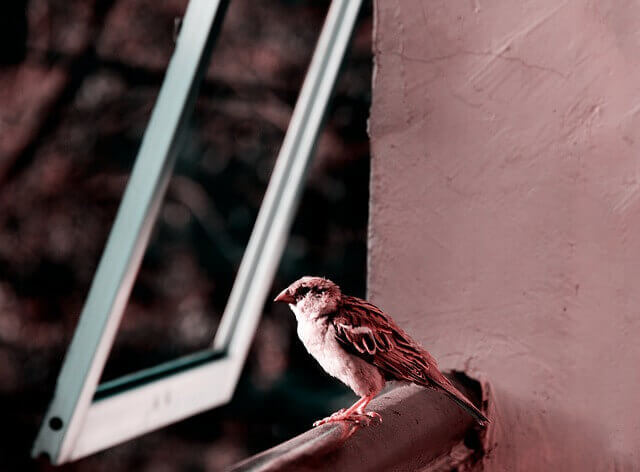
How to stop birds from flying into windows?
If your bird feeders are located near windows, you may be experiencing problems with birds flying into the windows to get their food. Some things you can do to prevent collisions.
Install Birdsavers
‘Birdsavers,’ Zen wind curtains, stand out as the most effective method for enhancing window visibility by reflecting UV light. Additionally, Zen wind curtains, featuring strategically placed strings, are highly recommended as a superior visual deterrent, effectively signaling the presence of obstacles to birds.
Move Your Bird Feeders Away From Windows
Move your bird feeders away from windows. This may mean moving them closer to the ground or placing them in a location where they are not visible from outside the window.
Put Up Window Screens
Window screens can be a useful way to stop birds from flying into windows. The screens can be made from materials like wire mesh, plastic, or metal.
They can be installed in front of the window or along the edge of the window. They should be wide enough so that they cover the entire window.
Lay Down Bird Tape or Gel on Window Sills
There are many ways to prevent birds from flying into windows, but the most popular way is to use bird tape or gel. Bird tape is a sticky material that can be placed on the window sill to keep birds from getting close.
Gel is a type of bird repellent that can be sprayed onto surfaces, such as windowsills, to keep birds away. One very effective bird tape I would highly recommend is the CollidEscape window decals for bird strikes. You can pick it up on Amazon for a good price.
Break Up Reflections
One way to stop birds from flying into windows is to break up their reflections. Blinds, curtains, and other coverings reduce window reflection—keeping birds from confusing the reflections of trees in the windows with actual trees. Another option is to install bird guards.
Replace Shiny Windows with Frosted or Etched Glass
If your home or office has super-shiny windows, you may want to consider replacing them with frosted and etched glass. This type of window treatment not only looks nicer, but it also makes it more difficult for birds to fly into them. By providing a barrier between the bird and the window, you can help prevent accidents from happening.
Hang Wind Chimes Near the Window
Some people believe that wind chimes can be used to deter birds from flying into windows. The theory is that the sound of the chimes will keep the birds away, and they will eventually lose interest in flying into windows because they are not getting the food or water that they need.
Move Plants, Feeders, and Birdbaths Away From Windows
There are a few things you can do to try and stop birds from flying into windows. One is to move plants, feeders, and birdbaths away from the window. You can also try to install bird screens or build a birdproof enclosure around the window.
Install Window Decals to Windows
There are a few methods you can use to try and stop birds from flying into your windows. One option is to install ultraviolet window decals that will attract the birds away from the window.
Another option is to apply temporary blown film to the windows, which will make it more difficult for the birds to fly into the window. I personally use these Anti-Collision Stickers and so far they have worked great.
Install a Tight Netting Around the Windows
Many homeowners are unaware that they can install a tight netting at least 3 inches away from and around their windows in order to stop birds from flying into them. The installation of this type of netting is simple and can be done by most homeowners with a bit of time and effort.
Can birds see their reflection in glass?
Birds can see their reflection in glass windows just like humans can, and they treat it like an intruder. The problem with this is that birds don’t understand that it’s a reflection of themselves. Instead, they believe it to be a competitor—a potential mate or another bird from a rival flock.
If the reflection poses a threat, then the bird will try to eliminate it by attacking the window. As you might imagine, this doesn’t end well for the bird.
Can birds see stained-glass?
Overall, they found that stained-glass presents a significant risk to birds. In contrast, some birds may be able to see the difference between clear and stained-glass, but they still collide with it anyway because it’s difficult to tell if it’s safe to fly through or not.
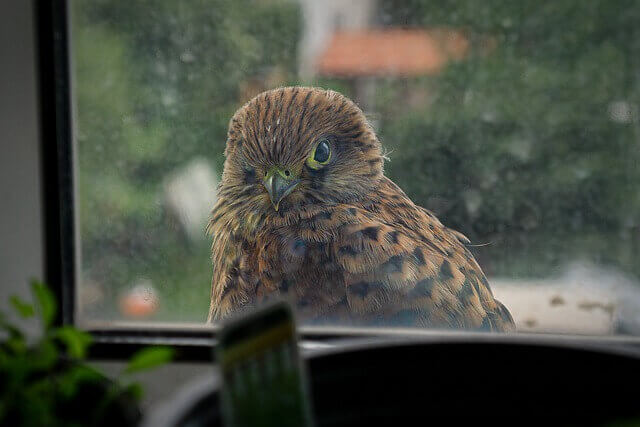
Can birds see through tinted glass?
The answer is no. Birds cannot see through tinted glass because a bird’s eyes are designed to perceive the world in a very different way from humans. Birds have difficulty seeing glass at all.
If a pane of glass has a UV-reflective coating, which blocks the invisible UV light that birds can see, they will not be able to perceive it and will fly into it.
Can birds see color?
Yes, birds have good color vision and can distinguish between colors, but the level of sophistication varies from species to species. Birds have been shown to have tetrachromatic vision with four types of cone cells in their retinas, similar to most humans.
This enables them to distinguish between red, green, blue and ultraviolet (UV) colors. The red-green axis of bird vision is believed to be more sensitive than that of humans with trichromatic vision.
Can birds see at night?
Yes, birds can see at night. Not all birds have good vision, though, and some need to rely on other senses. Nocturnal animals like owls have good night vision because their eyes are adapted for seeing in the dark.
Most birds are diurnal and so don’t have good night vision, but there are some exceptions. Some water bird species such as cormorants and shearwaters are known to be active at night.
Can birds see mirrors?
Birds have good eyesight, but can they see themselves in a mirror? It depends on the bird. The Eurasian Magpie, for example, can recognize its own reflection in a mirror test and will then preen in front of it.
It’s one of the few species to pass what’s called the “mark test” — putting a mark on an animal’s body and then seeing if it tries to remove it in front of a mirror.
Other birds also recognize their reflections in mirrors, but don’t know what they’re looking at. They behave as if they were seeing another bird nearby — pecking at their reflections or trying to engage with them by flapping their wings.
Can chickens see glass?
Since chickens have such good eyesight, you might think that they can see through glass windows. But this is not true – chickens actually struggle to see through glass. When a chicken sees your reflection in the window, it tries to attack it because it thinks that you are another chicken!
Can animals see glass?
Many animals have different vision than we do. Birds, for example, can see ultraviolet light, while most mammals can’t. But some animals can see through glass just fine, while others—including birds—can’t see the glass at all. It all comes down to light waves and how they travel.
Different wavelengths (or colors) of light travel along different paths as they bounce off an object and into our eyes. Glass bends light waves, changing their path for us, but not for all animals.
If you put a pane of glass in front of a bird, for example, the bird will fly straight into it because it won’t know the glass is there.
Humans and other higher-order mammals (dogs, cats, etc.) are able to see through glass because our eyes are sensitive to these curved light waves. Lower-order mammals like guinea pigs and hamsters can’t.
People Also Ask
What kind of glass can birds see?
You can purchase bird-safe glass with patterned ultraviolet-reflective coating that is invisible to humans but not to birds.
Or you could use self-adhesive window-film to make the glass visible to birds (make sure to use self-adhesive window-film that will not be affected by sunlight or rain).
What does glass look like to birds?
Birds can’t see glass because they rely on the reflection of ultraviolet light to tell them where obstacles are. Glass is transparent to UV light, so birds just don’t see it.
Can you revive a bird that hit a window?
- Often, people will find a bird that seems to be stunned. It may have hit a window or fallen out of the nest and appears to be unable to fly. Since birds can seem fine but die later from internal injuries, it’s important to be able to assess their condition. If you find an apparently stunned bird:
- If the bird is in immediate danger from cats or other predators, put on some gloves and put it in a safe place. If possible, place it near where you found it or close to its nest (if you can find it) so that its parents can continue caring for it.
- Wait several hours to see if the bird will recover by itself. If it does not revive, then proceed with the rescue steps below.
- Place the bird in a small box with ventilation holes and lined with paper towels or tissue. Keep the box in a warm, quiet place away from pets and children until you are ready to take action.
- Call your local wildlife rehabilitation center (search online or call your state’s Department of Natural Resources). They may be able to give advice over the phone concerning the best way to care for the bird until they can take over treatment.
What can birds see that humans can’t?
Birds, like us, are diurnal creatures and rely on their vision to get around. A bird’s eyes are quite different from those of humans.
Birds have a slightly higher density of cones in their retina than humans do. This allows birds to see in UV light, which is invisible to humans.
What does it mean when a bird keeps hitting your window?
The spiritual meaning of a bird hitting your window may be that you are trying to send messages from the other side. If this happens repeatedly, it may be a sign to contact someone who has passed on.
The window represents the veil between the worlds, and when a bird hits it, it means that someone on the other side is trying to get your attention.
Can a bird break a window?
The danger of a window breaking from a flying bird is more likely from larger birds such as geese, ducks, cranes, crows and herons.
A small hummingbird hitting a window probably isn’t going to cause much damage to the glass, although it could cause serious injury or death to the bird.
What is bird friendly glass?
Bird friendly glass has a pattern of ultraviolet reflective dots, strips or patterns on the outside surface. These patterns are visible to birds, but not to humans. When viewed from the outside, bird friendly glass looks like a regular window.
The ultraviolet markings act as a deterrent to birds by drawing their attention to the window and signaling them to avoid it. This can significantly reduce window strikes on buildings and help save countless bird lives.
Related Post: Can Birds Move Their Eyes? (The Shocking Truth!)

